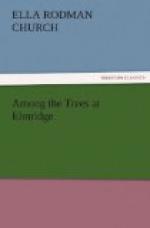“That is one of the things, Clara,” replied Miss Harson, “that people can have only in the place where they grow. In the South of England there is another great elm tree with a hollow trunk which has fitted into it a door fastened by a lock and key. A dozen people can be comfortably accommodated inside, and there is a story told of a woman and her infant who lived there for a time.”
“What a funny house!” said Malcolm. “Just like a woodpecker’s.”
“Another great elm, near London, has a winding staircase cut within it, and a turret at the top where at least twenty persons can stand. One species of this tree, called the wych-, or witch-, elm, was believed by ignorant people to possess magical powers and to defend from the malice of witches the place on which it grew. Even now it is said that in remote parts of England the dairymaid flies to it as a resource on the days when she churns her butter. She gathers a twig from the tree and puts it into a little hole in the churn. If this practice were neglected, she confidently believes that she might go on churning all day without getting any butter.”
“Isn’t that silly?” exclaimed Clara.
“Very silly indeed,” replied her governess; “but we must remember that the poor ignorant girl knows no better. The wood of the European elm is stronger than ours; it is hard and fine-grained, and brownish in color, and is much used in the building of ships, for hubs of wheels, axletrees and many other purposes. In France the leaves and shoots are used to feed cattle. In Russia the leaves of one variety are made into tea. The inner bark is in some places made into mats, and in Norway they kiln-dry it and grind it with corn as an ingredient in bread. So that the elm tree is almost as useful as it is beautiful.”
[Illustration]
CHAPTER IV.
MAJESTY AND STRENGTH: THE OAK.
“Here,” said Miss Harson, “is a small branch from an oak tree containing the young leaves and the catkins, which come out together; for the oak belongs, like the willow and the maple, to the division of amentaceous plants.”
“Oh dear!” sighed Clara at the hard name.
But Malcolm repeated:
“Amentaceous—ament. I know, Miss Harson: it’s catkins”
“Yes, it means trees which produce their flowers in catkins, or looking as if strung on long drooping stems; and the oak is the monarch of this family, and in Great Britain of all the forest-trees. It is especially an English tree, although our woods contain several varieties. But they do not hold the pre-eminence in our forests that the oaks do in those of England. The oak ordinarily runs more to breadth than to height, and spreads itself out to a vast distance with an air of strength and grandeur. This is its striking character and what gives it its peculiar appearance. Oaks do not always go straight out, but crook and bend to right and left, upward and downward, abruptly or with a gentle sweep.




